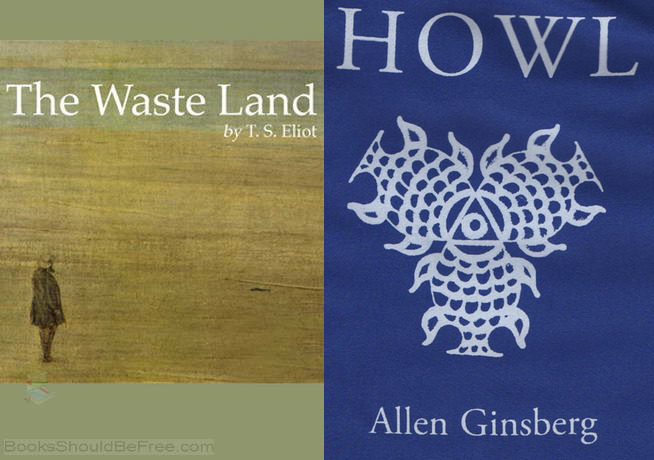A recent article, published in the International Journal of Social Psychiatry, reviews two landmark 20th-century poems to provide a powerful analysis of the role creative writing can play in understanding and coping with suffering. The authors review T. S. Eliot’s The Waste Land and Allen Ginsberg’s Howl to highlight the importance of a narrative approach to overcoming distress.
“If we want to avoid the trap of using psychiatric texts and manuals as de-contextualised documents and ignoring the history of mental illness… poems as a form of personal narrative and mirror image of society may be a good starting point of reflection,” write the authors, led by Moritz Wigand, a professor in the Department of Psychiatry and Psychotherapy at Ulm University in Germany.
Both poems were written after one of the World Wars (The Waste Land after WWI and Howl after WWII). The authors inform the reader that both poets wrote the poems during their own periods of “personal defeat or mental ill-health” and that the poems simultaneously provide a description of individual distress and a social commentary on the ills of the modern world. They argue, “social inequalities foster mental illness.”

The authors describe the study, “by analyzing the similarities and differences in the depiction of the modern world in The Waste Land and Howl and their different approaches to overcoming suffering, we can increase our empathic understanding of individual narratives of mental illness.” The authors used a hermeneutic approach, a type of qualitative research analysis, to study the poems.
The authors suggest that “these two works of art explore in a unique fashion the interplay between emotional suffering, conflicting relationships and the resulting outlook on society.” The way both poets engage with the construct of ‘madness’ is examined. Of note is the way Ginsberg portrays madness in Howl as “an act of individualism and social rebellion.”
“Beyond their putative therapeutic effect on the poets, The Waste Land and Howl are exceptional narratives of suffering in the light of a society which is perceived as hostile and deteriorated,” write the authors. Using the benefits the process of creating these works had on the poets, the authors remind psychiatrists and clinicians that creative writing can “offer what we might call almost psychotherapeutic solutions to the assumed problem of modernity.”
The authors warn that “contemporary psychiatry might be running the risk of neglecting the interplay between mental illness and social developments.” Therefore, psychiatrists and clinicians are encouraged to look beyond biological explanations and treatments for distress and engage in more narrative work.
****
Wigand, M. E., Wiegand, H. F., Rüsch, N., & Becker, T. (2016). Personal suffering and social criticism in T.S. Eliot’s The Waste Land and A. Ginsberg’s Howl: Implications for social psychiatry. International Journal of Social Psychiatry. Advance online publication. doi: 10.1177/0020764016667144 (Abstract)















Ginsberg was a psychiatric survivor and whose mother was tortured and killed by psychiatry. She was given ECT and had a lobotomy.
Report comment
I agree. I have an MFA in Creative Writing which qualifies me to teach writing at the university level. When I teach writing to survivors I de-emphasize “Writing to Heal” since to do so would imply that something is damaged and needs healing. Survivors have heard the Broken narrative too much already! Instead, I emphasize Empowerment. I emphasize Freedom of Speech. I emphasize writing as an Act, not as something some broken soul does to fix themselves. Writing is an act of self-empowerment through communication to an audience, and interaction with that audience. Even writing we do that we choose not to share, such as journaling, the implied audience is always present.
I encourage people to use this powerful method of communicating to reach out, to inform, to transform, to enlighten others, and to bring about understanding. Writing is a gift you send out into the world. We cannot control where it lands. I know when I write if I can shake up my audience, even infuriated my readers, then I have succeeded to enlighten.
Report comment
Hmm….I see we now have opportunity to edit our comments. How awesome.
I also see User Karma. I fear that is essentially “likes.” I’m not sure I like the “likes” feature since it could breed competitiveness or a popularity contest a la Facebook.
Report comment
The Wasteland is one of my favorite pieces of writing. I discovered it when I was in the deepest of my difficulties and it helped me to hang on and begin the climb back up to level ground. It’s so rich and full of color, even though Eliot describes a physical place that has very little color at all, except for brown and red. It spoke to me like very few written things ever have in my entire life. Before I lost it on my journey through the system I kept a copy of it on my bedside table and was part of my “secular bible” collection of books.
Report comment
“Howl” references Rockland State Hospital because a friend was admitted there and imprisioned
He also references the deaths of other friends an elegy not only for family but for a whole class of creative folks
Stanley Kunitz does this as well in his poem”The Layers”
Eliot had a nervous breakdown prior to leaving America and St Loius
He was not hospitalized and just lived through it
Big differences in socioeconomic status and culture here
“Howl” describes what happens to immigrant and others in the rank and file who step out of line
“Wasteland” is an waspish reaction to the utter folly and destruction of WWI
which is “celebrating” its 100 anniversary
Many many poets and writers were killed or damaged
Tolkien ‘s stories of Ircs and Mordor come straight out of his war in the trenches experience
In the other hand de Chardin’s theology came from the trenches as well but looked what the church did to him
Eliot as Ginsberg was multimodal
He brought ragtime music and other references into the world of the poem
It was not just writing it was all the arts including chess
His words as they are alone are music in and of itself
Back in the past poets were considered essential for a king
They were school for many years and they actual experienced planned altered states
They also were chosen art on and mainly had some sort of disability or disfigurement
We have lost many of our creative artists as in David Foster Wallace
They jumped on the MH ship and I think it forced them to at least for many to walk the plank and jump
We are not getting writing like this or if it is there it’s not above societal water
Marilyn Nelson a great African American poet has a sonnet cycle on Emmet Till
All of us creatives are walking around with masks on our mouths
Our society is not conducive to
thinking creatively and being awarded for it
Report comment
Too bad the author of this article uses over and over the very detrimental term “mental illness.”
Words have a lot of power, and in my opinion, need to used more widely to effect change.
How about “extreme states.” “spiritual emergence,” and the like?
Report comment